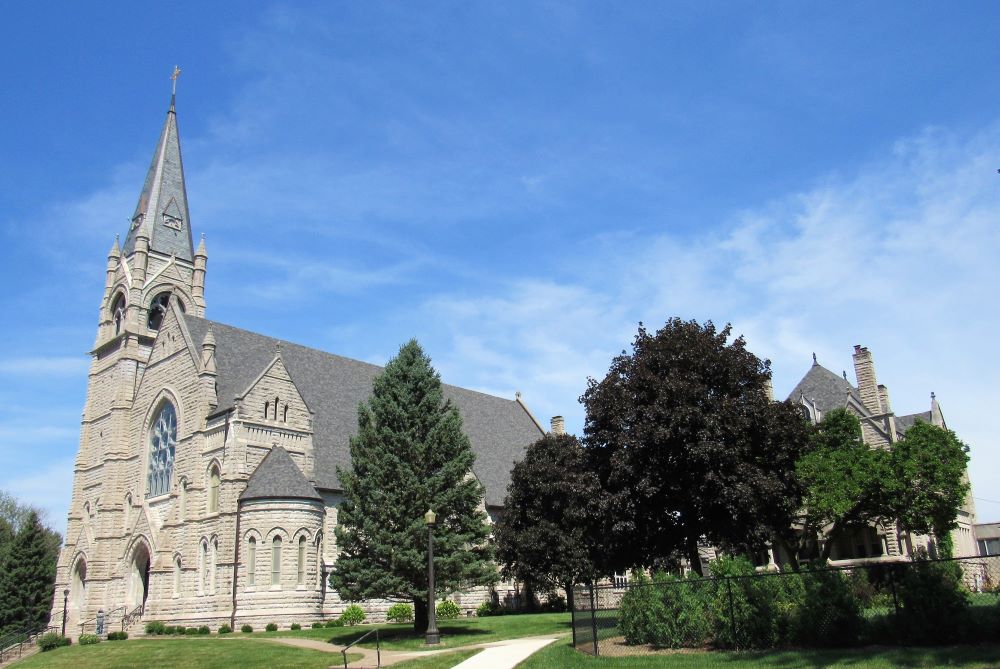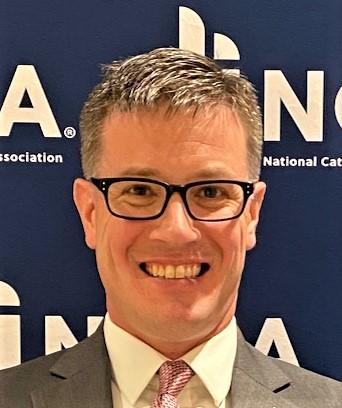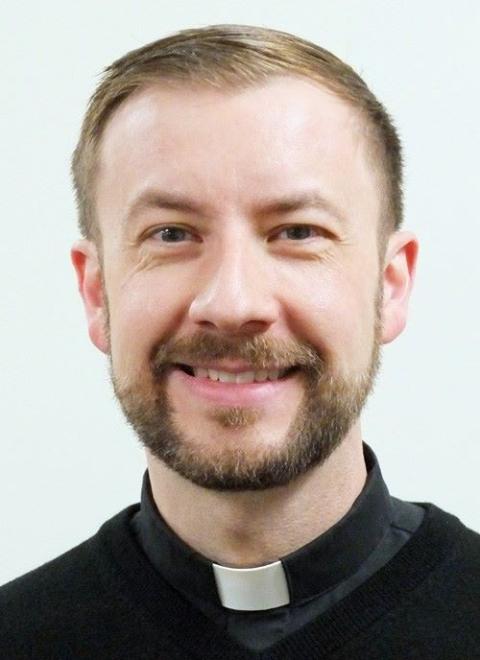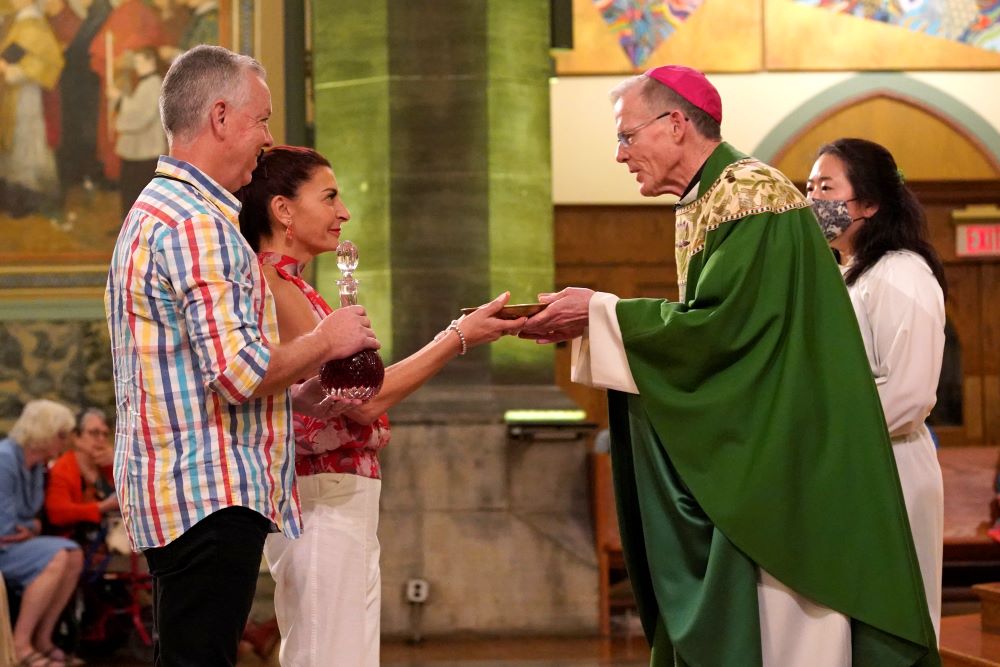
LGBTQ Catholics, advocates and family members are praising "Guidelines for Pastoral Accompaniment of Sexual and Gender Minorities," a new document from the Diocese of Davenport, Iowa, as a significant shift in how the church ministers to the LGBTQ community. Pictured is Sacred Heart Cathedral in Davenport, Iowa. (Wikimedia Commons/Farragutful)
The newest U.S. Catholic document on gender identity and sexual orientation is being celebrated by LGBTQ Catholics, advocates and family members as a significant shift in how the church ministers to a community long on its margins.
Bishop Thomas Zinkula of the Diocese of Davenport, Iowa, released "Guidelines for Pastoral Accompaniment of Sexual and Gender Minorities" Oct. 4 and in his letter introducing the guidance says the first response to LGBTQ individuals should be "one of welcome, love, and respect."
Many of the more than 45 existing diocesan documents on sexual orientation and gender identity include policies designating bathroom use, attire and sports participation on the basis of a person's "biological sex." The Davenport guidelines instead are written around five principles.
Other dioceses "have taken a one-size-fits-all approach that in most cases effectively deny the existence of trans people and exclude openly trans people from the life of the church," Deacon Ray Dever, a retired permanent deacon with a transgender child, told NCR. "I think that any family with a trans child would find in guidelines such as Davenport's a renewed hope that their child would someday feel welcomed in the church."
Zinkula, recently appointed archbishop of Dubuque, Iowa, where he will be installed Oct. 18, said the guidelines were crafted in response to clergy, school personnel and parish staff expressing a desire to learn how to better minister to individuals and families in their parishes and schools "who are experiencing gender discordance or differences in sexual orientation."
Bishop Thomas Zinkula of Davenport, Iowa, wrote that the first response to LGBTQ individuals should be "one of welcome, love, and respect." He is pictured here at a diocesan Synodal Summit June 17, 2023, at St. Ambrose University in Davenport. (OSV News/The Catholic Messenger/Anne Marie Amacher)
The five principles expounded in the guidelines are: a respect for the dignity of every person, body and soul; a recognition that persons who experience gender discordance or differences in sexual orientation are real and do not choose it; a commitment to loving people first and listening for deeper understanding; a commitment to involving others in the discernment process, especially the individuals affected, their families and medical professionals; and a case-by-case approach with a willingness to "make reasonable and appropriate accommodations when possible."
The gender committee — comprised of the superintendent of Catholic schools, coordinator of marriage and family life, vicar general, the director of Catholic Charities, and others — settled on a case-by-case approach because "blanket policies may prove ineffective and may risk doing greater harm," says the document. "Building trust and dialogue are essential."
Dever, who along with his wife shared his experience raising a trans child with the Davenport committee prior to the document's drafting, said the guidelines were "highly significant."
They are "truly a milestone in the evolution of the church's approach to the LGBTQ community, especially transgender people."
'We have zero opportunity to work with or evangelize or help in any way families facing these questions if we have such a hard line that they say, "See you later, Catholic Church." '
—Fr. Thom Hennen
The emphasis in many previous policies and guidelines has been on defending church teaching "and the ethics of things like whether someone can transition, while this document's first concern is: Is a person's human dignity deeply respected?" said Robert Shine, associate director of New Ways Ministry, a Maryland-based group providing advocacy and support for LGBTQ Catholics.
Shine spoke to NCR from Italy, where he's following developments at a historic monthlong Vatican summit — known officially as the Synod of Bishops' synod on synodality — that's convened delegates from around world to discuss numerous issues, including polemical ones like the role of women in the church and LGBTQ inclusion.
David Palmieri is a Catholic school educator who has conducted extensive research on the policies and compiled them in a public folder. He is also founder of a grassroots network of Catholic secondary educators called Without Exception.

David Palmieri founded a network of Catholic school educators who accompany LGBTQ students. (Courtesy of David Palmieri)
Last year Palmieri told NCR there's a disconnect "between the legalism of many policies and the lived experiences of the human person."
"They help create a culture of fear," he said.
The Davenport document, however, "is what guidance can look like when these matters are approached with a pastoral heart," said Palmieri in an interview on Oct 6.
Fr. Thom Hennen, vicar general and pastor of the Davenport cathedral, was part of the gender committee Zinkula formed nearly three years ago.
"We've taken a slower approach to this," Hennen said this summer. "We like to think we are taking a synodal approach, and we've learned a lot in the process — our own attitudes have changed."
The committee read and discussed theological and medical articles, attended educational sessions, and reviewed documents from other dioceses, the U.S. bishops and the Vatican. And committee members also spoke at length with LGBTQ individuals and their families.

Fr. Thom Hennen,vicar general and pastor of the Davenport cathedral, was part of the gender committee Bishop Thomas Zinkula formed nearly three years ago. (Courtesy of Thom Hennen)
Some bishops have claimed they've consulted with trans people, "but nothing about those consultations seem to show up in the documents," Shine said. "In this case, it very much shows that not only was there listening, but transgender voices were heard, taken to heart."
The document-crafting process also typically lacks transparency; in Davenport, the diocesan newspaper published several stories on the committee's progress.
Some reports said the committee has been criticized for not basing its work adequately on Catholic teaching. Davenport's guidelines do not quote or footnote specific documents or church teachings like many others do.
Pope Francis has described "gender ideology" as dangerous "because it blurs differences and the value of men and women.”
Yet on numerous occasions he has met with gay and transgender individuals and this summer told a young transgender person that "God loves us as we are."
The Davenport document shares phrasing used by the pope when he called for "pastoral prudence" and discernment when discussing an openness to Catholic blessings for same-sex couples.

Archbishop John C. Wester of Santa Fe, N.M., accepts the gifts during the closing Mass for the Outreach LGBTQ Catholic Ministry Conference at the Church of St. Paul the Apostle in New York City June 18. (OSV News/Gregory A. Shemitz)
Hennen said he anticipated there would be Catholics in the diocese who found significant fault with the Davenport guidelines.
"We'll need to be ready to get blowback from both sides, with each saying they can't accept the document," Hennen said.
But early feedback in the diocese is positive, according to Marianne Agnoli, coordinator of marriage and family life, while Catholic onlookers with disparate views laud it.
Abigail Favale is a writer and professor at the McGrath Institute for Church Life at the University of Notre Dame and author of The Genesis of Gender: A Christian Theory. She served as a consultant to the Archdiocese of Portland, Oregon, when it drafted its document, which has received much pushback.
Favale praised the Davenport document's discernment-based approach.
"Policies can be comforting precisely because they foreclose the often difficult work of discernment," said Favale. "But an approach of pastoral accompaniment, especially in the complex and sensitive area of gender and sexuality, needs to be responsive to the particular situation and the people involved."
Maxwell Kuzma, a transgender Catholic from Ohio who has criticized Favale's writings on gender identity, said the Davenport guidelines were "amazing to see coming from a Catholic bishop in 2023."
"So often in Catholic spaces there’s an asterisk after the words 'all are welcome.' "
In the Diocese of Sioux Falls, South Dakota, for example, Bishop Donald DeGroodad explicitly states its policy, which bars transgender Catholics from serving at Mass, is “intentionally exclusionary," adding that such exclusion applies to all who are in “a state of grave sin or public scandal."
'This document's first concern is: Is a person's human dignity deeply respected?'
—Robert Shine
Ish Ruiz, a theologian and ethicist who has worked with LGBTQ youths, said the Davenport document makes him feel hopeful because it reflects "a true spirit of synodality, which, at its heart, believes the Holy Spirit is revealed through our daily lives."
And unlike guidelines that indicate a wariness toward some medical professionals, like those in neighboring Diocese of Des Moines, Davenport's encourages a broad consultation with experts.
The Davenport document "represents a genuine quest to find God’s truth wherever it can be found, including both church doctrine and the wisdom of our medical and psychological experts," said Ruiz.
Hennen said the guidelines "try to bring these two things that seem contradictory together — the rich teaching on Christian anthropology that we can't toss out and a boots-on-the-ground pastoral approach."
Zinkula "wants us to be able to look parents in the eye and walk them through this," the priest said. "We have zero opportunity to work with or evangelize or help in any way families facing these questions if we have such a hard line that they say, 'See you later, Catholic Church.' "
Under the first principle — "dignity of the human person" — the guidelines say that "integral to our respect for human dignity are the Church’s beliefs about the nature of the human person, sexual difference, and gender."
"These are rooted not only in what the body reveals about itself, but also in history, culture, and the teachings of our Catholic tradition," it reads. "At the heart of our Christian anthropology is the concept that the human person is both body and soul."
Elaborating on the third principle — "love first and listen for understanding" — the document states that "we tend to love those who are most like us and to question, fear, and even exclude those who are more dissimilar. Once we are aware of this and embrace the summons of the Gospel to love all people as ourselves, we do not need to be ruled by our tendency to define people in terms of 'us' versus 'them.' "
Advertisement
The document ends with a list of recommended questions, intended to help parish and school communities develop their responses to different situations.
Among the queries: "What are your biases or blind spots?" "What accommodations could be made, if appropriate?"
In November, diocesan clergy, Catholic school principals and parish ministry leaders will gather to discuss the document and how best to accompany LGBTQ individuals going forward. The event will feature two presenters, including Palmieri.
Dever said he hopes the Davenport document will influence how other guidelines are crafted.
"Most dioceses in the U.S. have not yet promulgated documents on gender identity, but I expect that many are considering doing so," he said. "The stated goal of the Davenport document is 'to find a balance in addressing the real pastoral needs of sexual and gender minorities, while remaining true to the teachings of our Catholic faith.' "
"Those who share that goal," said Dever, "will find in the Davenport document an excellent template to follow."






